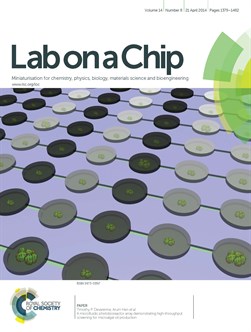May 15 2014
A team led by Arum Han, associate professor in the Department of Electrical and Computer Engineering at Texas A&M University, recently had their paper on microfluidic systems for algal biofuel development published in the journal Lab on a Chip as a cover article.

Microalgae, photosynthetic microorganisms present in most water, have been envisioned as future sources of renewable biofuel. Compared to current oil-producing feedstocks such as corn and soybean, microalgae are especially more attractive thanks to their significantly higher oil content. Microalgae also can be grown in wide ranges of water, and thus do not have to compete against food production requiring arable land. However, significant improvements are still required to make algal biofuel commercially viable, such as developing better microalgal strains showing higher growth and higher oil production.
Han’s team is developing microfluidic lab-on-a-chip systems that can be used as high-throughput screening tools to quickly evaluate the growth and oil production characteristics of numerous algal strains under various growth conditions. Their paper describes how the team demonstrated the development of 10s or 100s of pico-liter sized photobioreactors on a business card sized chip. The developed microsystem utilizes microfluidic technologies to individually control light conditions (intensity and day-night cycle) for each of the 10s or 100s of photobioreactors, and was used to understand how microalgae grow and produce oil under different environment. The article also was featured as a Lab on a Chip HOT article.
Using these microsystems, Han and his collaborators in Biochemistry and Biophysics at Texas A&M, Dr. Tim Devarenne, and in the Boyce Thompson Institute for Plant Research at Cornell University, Dr. David Stern, are working together to transfer the valuable hydrocarbon synthesis pathway of the slow-growing alga, Botryococcus braunii, to faster-growing algae with commercial potential through metabolic engineering. This multidisciplinary team is currently funded under a two million dollar award from the National Science Foundation’s (NSF) Emerging Frontiers in Research and Innovation (EFRI) office. With the new microsystem technology, the team is expected to significantly shorten the development time, where testing that previously required up to a year in a standard laboratory environment can be achieved in a week.
Han, director of the NanoBio Systems Lab and an expert in microfluidic lab-on-a-chip technologies, joined the electrical and computer engineering department in 2005. He received his bachelor’s degree from the Seoul National University in Korea, his master’s degree from the University of Cincinnati and his Ph.D. degree from the Georgia Institute of Technology, all in electrical engineering. Han’s research is at the interface of micro/nano technology and life sciences, with interest in solving grand challenge problems in the broad area of health and energy through the use of micro/nano systems technology and multidisciplinary team effort.
Honors include being a Eugene Webb Faculty Fellow of the College of Engineering (2014), TEES fellow (2012), and receiving an outstanding professor award from the electrical and computer engineering department (2012).
The paper can be found at http://pubs.rsc.org/en/Content/ArticleLanding/2014/LC/C3LC51396C#!divAbstract.
Lab on a Chip is a prestigious journal that publishes cutting-edge research at micro- and nano-scale in multidisciplinary areas of engineering and life sciences.